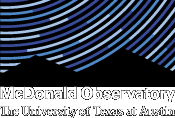Sally Dodson-Robinson Wins Annie Jump Cannon Award
LONG BEACH, Calif. — The American Astronomical Society has awarded Sally Dodson-Robinson, assistant professor of astronomy at The University of Texas at Austin, its Annie Jump Cannon Award for outstanding research and promise for future research by a woman. The prize was awarded at the society's 221st semiannual meeting in Long Beach, California.

